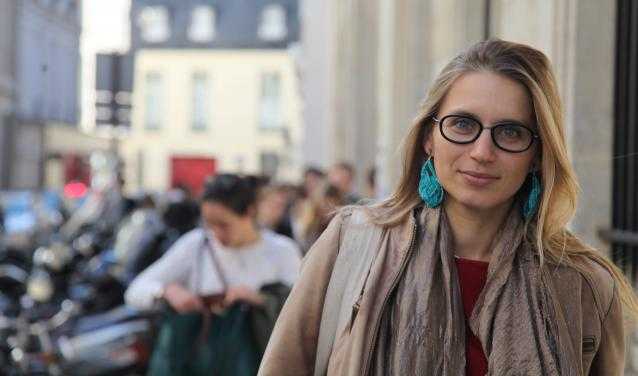Home>“The watchword for my classes is engagement”

07.10.2015
“The watchword for my classes is engagement”
Hélène Thiollet teaches international relations, comparative politics and migration studies at Sciences Po. Over the past ten years, her research has involved a lot of field work, and she has also worked as a consultant in the Middle East and Sub-Saharan Africa for NGOs, International organisations and firms. She explains how the connection between research and policy-making practices influences her way of teaching.
- Sciences Po: How would you define your pedagogical approach?
Hélène Thiollet: First, it is important for me never to teach theory on its own; I always connect it with case studies, stories and policy-making practices, and I think that this method fits Sciences Po’s educational approach well.
Second, the watchword for my classes is engagement. My aim is to bridge the gap between academic knowledge and international current events, and to do so it is essential to engage with students.
- Sciences Po: How do you manage to engage with students when lecturing to 200 undergraduates?
Hélène Thiollet: It is a challenge, but for me, that’s all the fun. Even in a lecture with hundreds of students, I want them to contribute something to the course, especially as Sciences Po students come from many backgrounds and countries of origin. This diversity is something I always try to leverage.
At the undergraduate level, I teach “Introduction to World Politics”. The lectures are attended by 150 to 200 students hailing from every continent. The challenge is to present complex material and to link it with the students’ multifaceted experience, that is, the situations they are exposed to at Sciences Po, in France, and also in their country of origin. To do so, I use a lot of case studies and I ask students for their feedback. With a large audience, exchanges are still possible, even if they are limited. And sometimes, you get carried away from the initial argument and course plan, but students generally take the course to the next level, questioning assumptions, debating concepts... Engaging with a whole lecture theatre sometimes makes it difficult for me to balance my lecture course. But even if it disrupts my schedule a bit, interactivity is vital for both the lecturer and the students.
- Sciences Po: I imagine that it is much easier to engage with undergraduate students in seminar sessions. What is the philosophy behind your undergraduate seminar?
Hélène Thiollet: Both at the undergraduate and graduate levels, the seminar format encourages participation. Each student is asked to engage in a critical fashion with the material, whether it is a reading or data. The objective is to provide them with the tools to construct their own opinions, and I use progressive pedagogy to do so. At the end of the seminar, students should be empowered by the material.
At the undergraduate level, the “International Actors in Africa” seminar taught with Michelle Reddy is designed to be both academic and practical. Students are asked to develop a mock development project, and the aim is to be as realistic as possible in terms of defining the project, the stakeholders, project finance, etc. Basically, we use academic material to design an original and effective development project.
Typically, my undergraduate seminars are organised into two parts: I start by presenting the academic material for about 45 minutes, then the last hour is given over to discussion with students. Even during the discussion, my aim is to combine knowledge acquisition and intellectual empowerment.
- Sciences Po: Do you use a different approach when you teach graduate students?
Hélène Thiollet: At the graduate level, my seminars are more research-oriented. One, “Governance of Global Migration”, is research-oriented and is included in a collaborative research project called MOBGLOB. In my other graduate seminar with Antoine Pécoud, “Migrant Issues in Large Metropolises”, we teach migration studies to be applied to urban studies. We start the seminar with a short presentation of the material, let’s say 20 minutes, then we jump directly into the debate.
We use scientific papers and frameworks to stimulate debate with students, but they are also asked to write policy-oriented reports on one particular city and its migrant communities, or to compare several case studies. The objective for them is very quickly to be ready to take on positions in a mayor’s office, a consulting firm, an international organisation, a local energy agency, an urban planning agency, etc. Some of them go on to a PhD and the others are well equipped to face the intellectual and technical challenges of their future jobs with a critical insight into the social, political and economic dimension of their work!
It is important to know how to use academic material to understand what is going on in the field.
With regard to the current migrant crisis for instance, while there is a lot of research on the migration issues we are facing, the various stakeholders do not make use of the existing research.
Related links
Learn more about undergraduate education at Sciences Po
Learn more about graduate education at Sciences Po